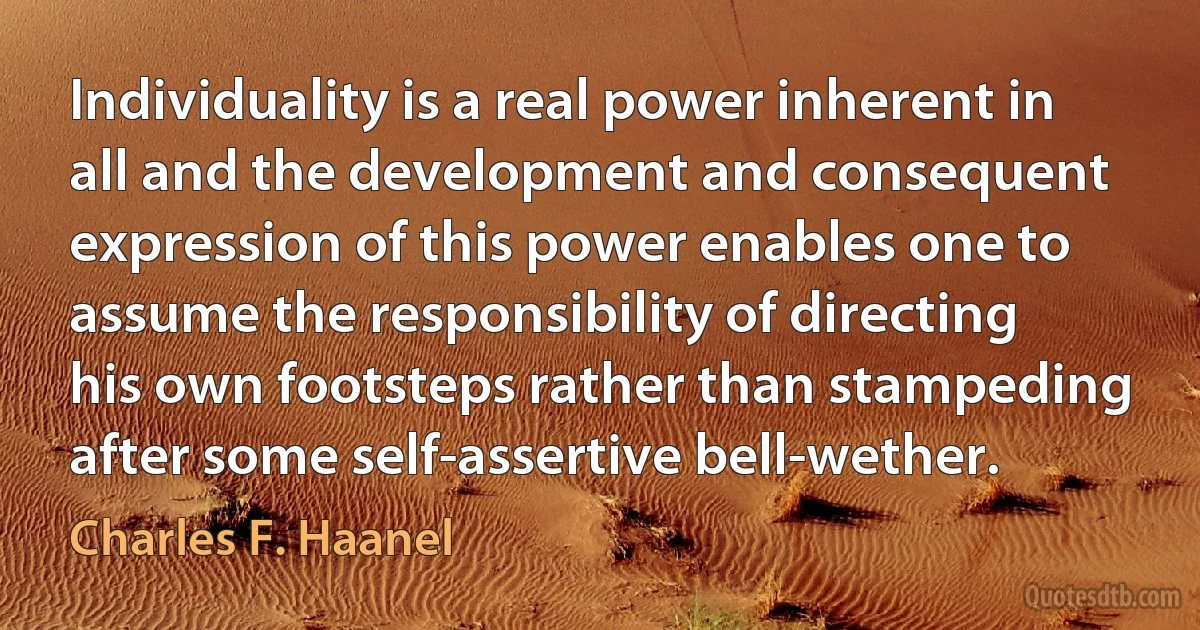Consequent Quotes - page 2
An academic debate on any subject should concentrate on the pros and cons of the arguments presented by the two (or more) opposing sides in the debate; it should be conducted in an open and sincere atmosphere; and the natural desire (not academically wrong in itself) to win the debate should not be allowed to overpower the academic desire to arrive at the truth... And an academic debate cannot be won by the simple expedient of name-calling and label-sticking, and consequent disqualification of the opposing side from even taking part in the debate.

Shrikant Talageri
By that time a structure of property rights had developed in the Netherlands and England which provided the incentives necessary for sustained growth. These included the inducements required to encourage innovation and the consequent industrialization. The industrial revolution was not the source of modern economic growth. It was the outcome of raising the private rate of return on developing new techniques and applying them to the production process.

Douglass North
The major weapon now being used by the combined Forces of Evil is chaos, disruption, lack of established security, and consequent fear... The entire rhythm of international thinking has to be altered, and that constitutes a slow and arduous task; the evil personalities which, in every country, are responsible for the chaos and uncertainty, have eventually to be replaced by those who can work in co-operation with the rhythm of the seventh Ray, and thus produce ordered beauty. p. 668.

Alice Bailey
When we try to develop and procure benefits for the world with universal love as our standard, then attentive ears and keen eyes will respond in service to one another, then limbs will be strengthened to work for one another, and those who know the Tao will untiringly instruct others. Thus the old and those who have neither wife nor children will have the support and supply to spend their old age with, and the young and weak and orphans will have the care and admonition to grow up in. When universal love is adopted as the standard, then such are the consequent benefits. It is incomprehensible, then, why people should object to universal love when they hear it.

Mozi
[E]ven if we disagree about the Iraq invasion in 2003 and the consequent moves made by Bush 43 Administration, the decision of Obama Administration to retreat, especially announcing it, this is the worst you can do. At noon, at that day, that month, we are out. By sending the signal to the radical Islamists, to the forces that were about just to recover and prepare again for attacks against the free world, that was a recipe for disaster. It created a vacuum. It's not a surprise that we live in a world today that is a much more dangerous place than in 2008. It helped Vladimir Putin to regain his confidence and because after his attack against the Republic of Georgia in 2008 in August, he was basically rewarded by Obama/Clinton "reset” policy instead of paying a price for taking territory of neighboring country.

Garry Kasparov
There are good people who, being discontented with present-day conditions, think that these conditions can be cured by a return to what they call the "principles of the fathers.” [...] But to go back to the governmental theories of a hundred years ago would accomplish nothing whatever; for it was under the conditions of unrestricted individualism and freedom from Government interference, countenanced by those theories, that the trusts grew up, and private fortunes, enormous far beyond the deserts of the accumulators were gathered. [...] It may be that, in the past development of our country, complete freedom from all restrictions, and the consequent unlimited encouragement and reward given to the most successful industrial leaders, played a part in which the benefits outweighed the disadvantages. But nowadays such is not the case.

Theodore Roosevelt
Islam never had its own version of the Reformation and the Enlightenment or a consequent acceptance of pluralism and the separation of church and state. Fortunately there are numerous Muslim leaders who think their faith needs to modernise from the kill-or-be-killed milieu of the Prophet Mohammed.

Tony Abbott
The rather more dubious side of Nietzsche's 'evolutionism' is his glorification of the warrior -- particularly when, as an exemplification of the warrior-hero, he chooses an archetypal 'spoilt brat' like Cesare Borgia. Nietzsche's own physical weakness and consequent inability to escape the atmosphere of the study leads him to take a rather unrealistic view of the man of action.

Colin Wilson
Whatsoever therefore is consequent to a time of war, where every man is enemy to every man, the same consequent to the time wherein men live without other security than what their own strength and their own invention shall furnish them withal. In such condition there is no place for industry... no knowledge of the face of the earth; no account of time; no arts; no letters; no society; and which is worst of all, continual fear, and danger of violent death; and the life of man, solitary, poor, nasty, brutish, and short.

Thomas Hobbes
There is another responsibility of the states. It is quite aside from this one of jurisdiction. It is the subject of law enforcement. We are not a lawless people, but we are too frequently a careless one. The multiplicity of laws, the varied possibilities of appeals, the disposition to technicality in procedure, the delays and consequent expense of litigation which inevitably inure to the advantage of wealth and specialized ability - all these have many times been recounted as reproaches to us. It is strange that such laxities should persist in a time like the present, which is marked by a determined upward movement in behalf of the social welfare. But they do exist. They demonstrate a need for better, prompter, less irksome, and expensive administration of the laws. They point the necessity for simplification and codification of laws; for uniformity of procedure; for more accurate delimitation of State and Federal authority.

Calvin Coolidge
Whatsoever therefore is consequent to a time of Warre, where every man is Enemy to every man; the same is consequent to the time, wherein men live without other security, than what their own strength, and their own invention shall furnish them withall. In such condition, there is no place for Industry; because the fruit thereof is uncertain: and consequently no Culture of the Earth; no Navigation, nor use of the commodities that may be imported by Sea; no commodious Building; no Instruments of moving, and removing things as require much force; no Knowledge of the face of the Earth; no account of Time; no Arts; no Letters; no Society; and which is worst of all, continuall feare, and danger of violent death; And the life of man solitary, poore, nasty, brutish, and short.

Thomas Hobbes
From the invention of the cotton-gin slavery became a progressive system - not passively tolerated as in process of extinction, but actively striving for development and extension. It became a conscious political power. It made no offensive professions. It still deprecated itself as an evil, so difficult to deal with, and, with an adroit allusion to Ham and Onesimus, it smoothed the ecclesiastical conscience of the country and only asked to be let alone. And it was let alone. The War of 1812, and the consequent commercial confusion and renewed devotion to trade, held the country torpid upon the subject. If anybody looked at slavery inquisitively, it folded its hands demurely upon its breast and said, 'I am such a dreadful thing! How unfortunate that I should exist! What can be done with me? Just please to let me alone, that is all I want. A leper, you see; a miserable leper!

George William Curtis
Whatever be the effect of slavery upon the States where it exists, there can be no doubt that its moral influence upon the North has been most disastrous. It has compelled our politicians into that first fatal compromise with their moral instincts and hereditary principles which makes all consequent ones easy; it has accustomed us to makeshifts instead of statesmanship, to subterfuge instead of policy, to party-platforms for opinions, and to a defiance of the public sentiment of the civilized world for patriotism.

James Russell Lowell
A new theory by the author has been added, which draws the physical inferences consequent on the extension of the foundations of geometry beyond Reimann... and represents an attempt to derive from world-geometry not only gravitational but also electromagnetic phenomena. Even if this theory is still only in its infant stage, I feel convinced that it contains no less truth than Einstein's Theory of Gravitation-whether this amount of truth is unlimited or, what is more probable, is bounded by the Quantum Theory.

Hermann Weyl
There is a contrast of primary significance between Augustine and Pelagius. The former crushes everything in order to rebuild it again. The other addresses himself to man as he is. The first system, therefore, in respect to Christianity, falls into three stages: creation – the fall and a consequent condition of death and impotence; a new creation – whereby man is placed in a position where he can choose; and then, if he chooses – Christianity. The other system addresses itself to man as he is (Christianity fits into the world). From this is seen the significance of the theory of inspiration for the first system; from this also is seen the relationship between the synergistic and the semipelagian conflict. It is the same question, only that the syngeristic struggle has its presupposition in the new creation of the Augustinian system.

Søren Kierkegaard
The motivation that drives the commission of the worst human atrocities is an inevitable social consequence of the refusal of the self-conscious individual to make the sacrifices appropriate to establishing a harmonious life, and their consequent degeneration into a kind of murderous and resentment-filled rage propagating endlessly through its variations in society until everything comes to an end.

Jordan Peterson
By this I refer to the fact that at the same time several people may each possess some portion of the rights to use the land. A may possess the right to grow wheat on it. B may possess the right to walk across it. C may possess the right to dump ashes and smoke on it. D may possess the right to fly an airplane over it. E may have the right to subject it to vibrations consequent to the use of some neighboring equipment. And each of these rights may be transferable. In sum, private property rights to various partitioned uses of land are "owned" by different persons.

Armen Alchian
Biologically, life is not maintenance or restoration of equilibrium but is essentially maintenance of disequilibria, as the doctrine of the organism as open system reveals. Reaching equilibrium means death and consequent decay. Psychologically, behaviour not only tends to release tensions but also builds up tensions; if this stops, the patient is a decaying mental corpse in the same way a living organism becomes a body in decay when tensions and forces keeping it from equilibrium have stopped.

Ludwig von Bertalanffy



